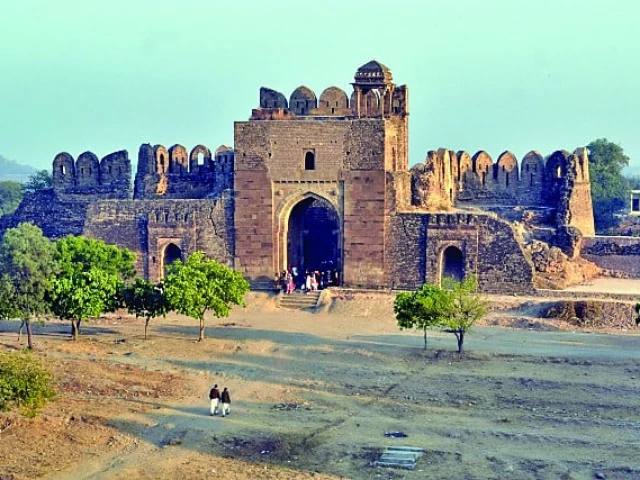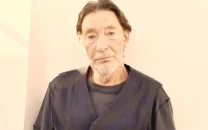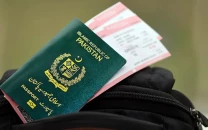Digging up Punjab's buried past
From Taxila to Cholistan, four sites to be reopened for excavation in October

The Punjab government has announced a major archaeological initiative to reopen excavations at four historic sites in the province next month, aiming to shed new light on ancient heritage, officials said on Thursday.
The excavation work will begin in October at Taxila, Rohtas Fort, Tilla Jogian, and the desert forts of Cholistan. According to the Archaeology Department, the excavations will continue until February, with four dedicated teams assigned to the project.
In Cholistan, seven out of the 21 forts still remain in their original condition and will receive special focus, according to the officials. A development budget of Rs800 million has been allocated for the initiative, they added.
"The department's role extends beyond preserving old structures to uncovering new discoveries," said Dr Ehsan Bhutta, Punjab's Secretary for Tourism and Archaeology. He noted that the project is expected to reveal many hidden aspects of Punjab's past and the wider history of the region.
Rohtas Fort, built in the 16th century by Sher Shah Suri, stands as a symbol of Mughal-era military architecture near Jhelum. Tilla Jogian, also near Jhelum, has long been regarded as a spiritual site for both Sufi mystics and Hindu ascetics.
In Cholistan, the desert forts — including the prominent Derawar Fort — once guarded the trade routes linking Central Asia with the Indian subcontinent. Despite the harsh desert climate, their remains still testify to centuries of history.
"The evidence we currently have is too limited to fully understand the political, religious, and social role of these sites centuries ago," Dr Muhammad Hameed, Chairman of the Archaeology Department at Punjab University, said emphasising the importance of renewed excavations.
"Without concrete findings, restoring them to their true historical context is impossible. Preserving these sites for research and tourism is essential to present their global significance."
Afzal Khan, former director of the Punjab Archaeology, explained that excavations in the past were conducted on a small scale, limited to what could be immediately preserved. "But now, with modern technology, new research methods are available," he added. Khan expressed hope that fresh excavations would yield important artefacts for research and display in the museums.
Another former director, Malik Maqsood Ahmed, noted that although Punjab has seen several excavations in the past, this is the first time such significant budgetary support and priority have been given to archaeology in the province.
Taxila, considered a major centre of the Buddhist Gandhara civilisation, has been excavated intermittently since 1913, yielding monasteries, stupas, and Buddhist sculptures.
These experts believe that any new evidence uncovered during the excavations will contribute not only to Punjab's cultural heritage but also to a deeper understanding of the broader history of the Indian subcontinent.
Dr Bhutta said that the Archaeology Department and the Punjab Tourism Development Corporation are jointly pursuing the project. "Findings from the excavations will be made accessible not only for academic research but also for tourism promotion."
Pakistan is home to numerous ancient and culturally rich sites, including the Indus Valley Civilisation sites of Mohenjo-daro and Harappa in Punjab, the ancient Buddhist city of Taxila and the Buddhist monastic complex of Takht Bahi.
Other significant sites included the magnificent Lahore Fort, the ancient Katas Raj Temples, reflecting a diverse heritage of ancient civilisations and rulers. Even, the modern city like, Islamabad traces its history stretched back to prehistoric times — nearly two million years ago.
'Buddhist Stupa' is one notable remnant of this rich past and oldest of the region, located at Ban Faqiran. Reaching it required a steep two-hour hike above nearby caves, which are located on main Shah Allah Ditta Road.
It was believed that, the stupa belonged to the Buddhist civilisation in previous centuries and was constructed using ashlar and diaper masonry. It is considered Islamabad's only surviving Buddhist monument.
Recognising the opportunity, the Federal Culture Ministry is stepping up efforts to put the sites like Buddha Stupa and others, in the global spotlight. In this regard, Culture Minister Aurangzeb Khichi is optimistic about the launch of the National Culture Policy aimed at reviving Pakistan's rich heritage.
"As part of our initiative, a Buddhist Cultural and Information Centre is being established at Lok Virsa in Islamabad," said Khichi, underscoring, "Facilities at key heritage sites, including at Shah Allah Ditta, are also being upgraded."
For many, the combination of natural beauty, peaceful surroundings and spiritual history made Ban Faqiran a one-of-a-kind destination. As Pakistan leans into its ancient roots to shape a modern tourism narrative, forgotten treasures may soon become symbols of both heritage revival and global connection.
(WITH INPUT FROM APP)




















COMMENTS
Comments are moderated and generally will be posted if they are on-topic and not abusive.
For more information, please see our Comments FAQ